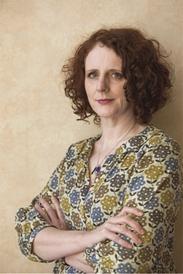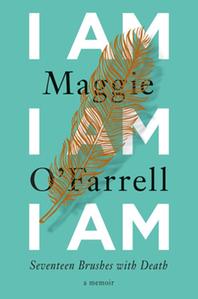
|
|
| photo: Murdo Macleod | |
Inspired by her daughter's severe case of anaphylaxis, Costa Novel Award-winning author Maggie O'Farrell's memoir, I Am, I Am, I Am: Seventeen Brushes with Death (Knopf, February 6, 2018), explores her close encounters with death, in forms that range from her childhood encephalitis to a chance meeting with an apparent serial killer. O'Farrell's (The Hand That First Held Mine) candor and grace render these stories both sobering and life-affirming.
You've published seven novels since 2000, but this is your first work of nonfiction. What were some of the challenges in writing a memoir?
I always planned to never write a memoir. I never thought I would write about myself in that way. I've always been uncomfortable with the idea of exposing so much about yourself. The genre of memoir can also be a huge tax on your friends and family. But you don't necessarily choose the book, the book chooses you. This book just appeared in the back of my notebooks. I was so reluctant about it that when I signed the contract in the U.K., I said I didn't want an advance for it, because I didn't know whether I was going to finish it or, if I did, whether I was going to publish it. My agent told me I had to be paid something to make it legal, so I asked for £1.
What led to your decision to structure the memoir as 17 non-chronological essays about what you call "brushes with death," each one associated with a body part or body system, rather than a more conventional narrative?
As a writer of fiction, chronology is never something that's interested me. I find it quite tyrannical. I don't think our brains, our memories, our personalities work like that. Coming up with the structure was quite liberating for me. Not only did the format of these episodes release me from the tyranny of chronology, it allowed me to leave quite a bit out, including not having to expose other people who don't have a right of reply to what I write.
You have three children, and you've said that you wrote this book to help them understand that your daughter's health challenges, including an extreme risk of anaphylactic shock, aren't abnormal. They're still perhaps too young to absorb that message fully, so how have you dealt with it, if at all, in their lives so far?
The book was written because my daughter suffers this life-threatening immune disorder, something we grapple with on a daily basis, the idea of keeping her alive. If one member of a family has a disability or health problem, it's something that's shared by the whole family. As the mother, you have to think about how it affects the other two children. The book was an attempt to try to make sense of what my daughter is going through, what it's like to come so close to death, to feel your body conspiring against you, but also what it's like to be close to someone you love in that condition, what it's like for my other children to deal with that.  Your own childhood was profoundly affected by a bout of encephalitis at age eight. Can you describe how that's shaped the rest of your life, both physically and emotionally?
Your own childhood was profoundly affected by a bout of encephalitis at age eight. Can you describe how that's shaped the rest of your life, both physically and emotionally?
It's quite hard to imagine what I would have been like without that experience. It happened at such a young age that it's always felt very much a part of me. In a lot of ways, I don't know where my encephalitis begins and where I end. There are so many things in my physical being that seem completely normal to me that I realize to other people aren't normal. I wouldn't describe what I have as disabilities; they're mild incapabilities, perhaps. I just get on with it. Someone once asked me, if you could wave a magic wand and wish that you didn't have encephalitis as a child, would you do it? And I don't know. Coming so close to death at such a young age, and hearing people talk about it, I think gives you a very strong sense of living on borrowed time, that it's a bit extra, and that I need to make the most of it. It could have made me quite a cautious person, quite fearful, but in fact it had the opposite effect. I think it made me a bit too reckless, actually. And when I didn't die, the doctor said I would never walk again, never write again, but I managed to find a way out of that particular destiny. I've always felt, since then, like the luckiest person alive.
At least two of the incidents in the book involve encounters with criminals--one a likely serial killer who murdered another young woman shortly after you met him, the other a machete-wielding thief. In describing the former, you write, "Death brushed past me on that path, so close that I could feel its touch, but it seized that other girl and thrust her under." Have these incidents influenced how you feel about life's sheer fortuity?
The first instance, when I was 18, I completely buried. I never talked to anyone about it and left the area where it occurred soon afterwards. In an odd sense, I feel both quite lucky to have survived and quite guilty. It very easily could have been me, but it turned out to be someone else. One of the reasons I never talked about the incident in later life is that, in a sense, the story doesn't really belong to me, the narrative isn't mine. The central tragedy belongs to the other girl; I'm just a footnote in that chapter. And one of my impulses in writing that chapter was to protect her. As a novelist, you can have complete ownership. In a memoir, it's much more nuanced and complicated.
You write, "We are, all of us, wandering about in a state of oblivion, borrowing our time, seizing our days, escaping our fates, slipping through loopholes, unaware of when the axe may fall." Have your near-death experiences made you more mindful, more appreciative of life?
From a very young age, I've had a sense of the frailty of human existence. That we all hang by a thread; that we all could take a few steps in the wrong direction; that we could take the wrong path; that we could meet the wrong person and that's it, it's all over. Probably more than most people, I have a stronger sense of how temporary it all is and how fragile we all are, but also how strong. There's a huge amount of strength in our frailty.
In many ways, I Am, I Am, I Am is quite a life-affirming book, but what do you say to readers who might be inclined to avoid it because they consider the subject matter morbid or depressing?
Even though the subtitle includes the word "death," the book is really about life. It's about how we carry on, why it's important to live your life to the fullest. This is something I say to my daughter when she feels upset about what she's going through: "Everybody has something they're struggling with, that challenges them." We've all just got to try to live the best life we can, live the biggest life we can. We all have strictures around us, whether they're physical or financial, spiritual, geographical or social. Everybody has to do the best. We all have to seize the day, because we're all only here for a short time. --Harvey Freedenberg, attorney and freelance reviewer

